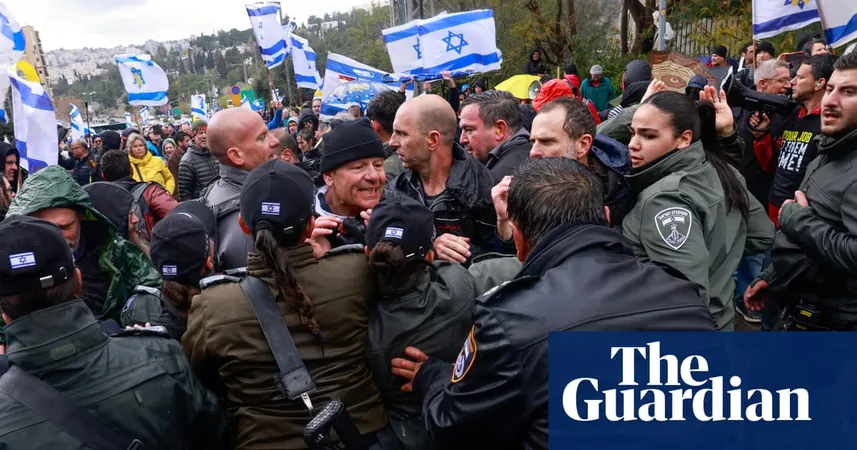
Massive Protests Erupt in Israel Against Netanyahu's Government and Gaza War Policies
2025-03-20
Author: Wai
In an unprecedented display of discontent, tens of thousands of Israelis dawned the streets to demand not only a new ceasefire in Gaza but also rallied against what they perceive as a severe assault on the country's democratic principles by Prime Minister Benjamin Netanyahu's right-wing coalition government.
Traffic ground to a halt as key highways were blocked, and police responded with at least 12 arrests during the intense demonstrations in major cities like Jerusalem and Tel Aviv. Activists warn that this wave of protests is just the beginning, with additional marches expected in the coming days.
The immediate spark for this widespread outrage was Netanyahu's controversial attempt to dismiss Ronen Bar, the director of Israel's internal security agency. However, his decision to break a two-month truce in Gaza with aggressive airstrikes has further ignited public fury. Protesters blame the government for perpetuating the ongoing conflict for political gain while neglecting the plight of the 59 hostages believed to be held by Hamas, approximately 24 of whom are reported to still be alive.
Eitan Herzel, the chief executive of the Brothers in Arms protest movement, articulated the protesters' sentiments, stating, “This government has now also started a war, once again, to protect itself, to divert the discourse from the things that bother the public in Israel. The government has lost all legitimacy on every possible level… They are failing.”
On Wednesday, thousands gathered near Netanyahu's official residence in Jerusalem, waving Israeli flags and displaying placards demanding the return of hostages. Some protesters chanted “hostages deal now” while others beat drums, emphasizing their calls for action.
Participants included notable figures like Ora Nakash Peled, a former senior naval officer and an organizer of the protest, who highlighted their determination for ongoing resistance against government actions. “I think we have made our point… [The protest] cannot be violent [but] it doesn’t have to be polite,” she remarked.
The demonstrations sent a clear message against perceived threats to democracy, underscored by chants like, “Israel is not Turkey, Israel is not Iran.” Protesters pointed to a series of alarming actions taken by Netanyahu, including his attempt to oust Bar and efforts to remove Attorney General Gali Baharav-Miara, who has voiced concerns about legality regarding Bar's potential dismissal.
Legal expert Dr. Amir Fuchs emphasized, “The government has the authority to fire Bar but still has to comply with administrative law. So, for example, if there is seen to be a conflict of interests, it could be stopped by the Supreme Court.”
Adding fuel to the fire, investigations by Shin Bet into Netanyahu’s inner circle for alleged breaches of national security—including leaking classified information and financial improprieties linked to Qatar—have deepened public mistrust in the prime minister's leadership.
As Netanyahu grapples with an ongoing corruption trial that could result in a prison sentence, protests have also been fueled by fears regarding proposed reforms that could further politicize judicial appointments, thereby undermining the independence of Israel's legal system.
The ramifications of Netanyahu's policies have led to significant resignations among high-ranking officials, with many implicated in the broader failures leading up to the catastrophic Hamas attacks in October 2023. The security breaches resulted in the deaths of over 1,200 individuals, primarily civilians, but Netanyahu has faced immense pressure to accept accountability, which he has so far resisted.
Furthermore, the prime minister's claims of a “leftist deep state” supposedly undermining his administration have resonated with his supporters, although this narrative has been criticized as an attempt to deflect attention away from the mounting issues facing his government.
Polls currently indicate that if elections were held, Netanyahu’s party could face significant losses. However, he is likely to brush aside the ongoing protests, which, while substantial, are not yet at the scale witnessed during similar unrest in 2023. As the government approaches a crucial budget vote, which could potentially strengthen Netanyahu's position, the future of Israeli democracy hangs in the balance.
Further complicating matters is the political landscape, where the return of Itamar Ben-Gvir, a far-right politician, to the government highlights Netanyahu's reliance on the nationalist-religious factions to maintain his grip on power. Observers note that fragmented opposition groups have recently united, yet a viable alternative to Netanyahu is still lacking as protestors echo concerns over the government's handling of both the Palestinian conflict and internal democratic challenges.
While demonstrators emphasize the urgent need for a humanitarian ceasefire to facilitate the return of hostages, their protest is broader—mirroring a pervasive mistrust in government officials and their decisions regarding the conflict in Gaza. This ongoing unrest signals deep-seated frustrations within Israeli society, representing a critical juncture for both the public and political leaders.




 Brasil (PT)
Brasil (PT)
 Canada (EN)
Canada (EN)
 Chile (ES)
Chile (ES)
 Česko (CS)
Česko (CS)
 대한민국 (KO)
대한민국 (KO)
 España (ES)
España (ES)
 France (FR)
France (FR)
 Hong Kong (EN)
Hong Kong (EN)
 Italia (IT)
Italia (IT)
 日本 (JA)
日本 (JA)
 Magyarország (HU)
Magyarország (HU)
 Norge (NO)
Norge (NO)
 Polska (PL)
Polska (PL)
 Schweiz (DE)
Schweiz (DE)
 Singapore (EN)
Singapore (EN)
 Sverige (SV)
Sverige (SV)
 Suomi (FI)
Suomi (FI)
 Türkiye (TR)
Türkiye (TR)
 الإمارات العربية المتحدة (AR)
الإمارات العربية المتحدة (AR)